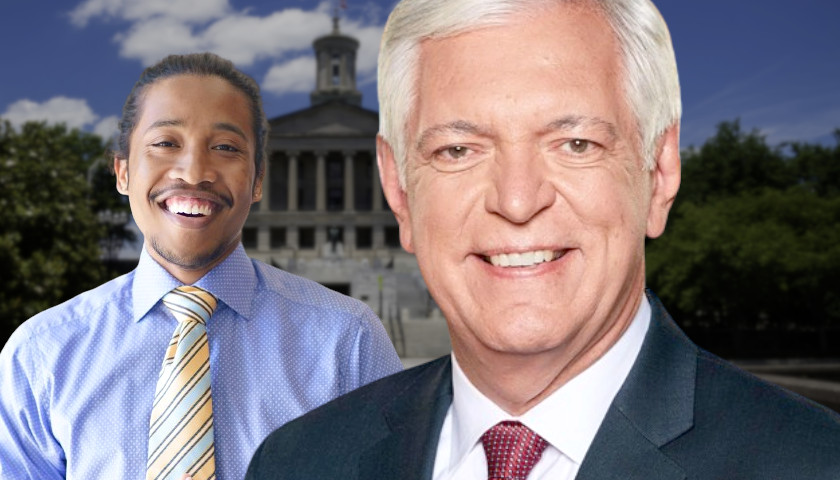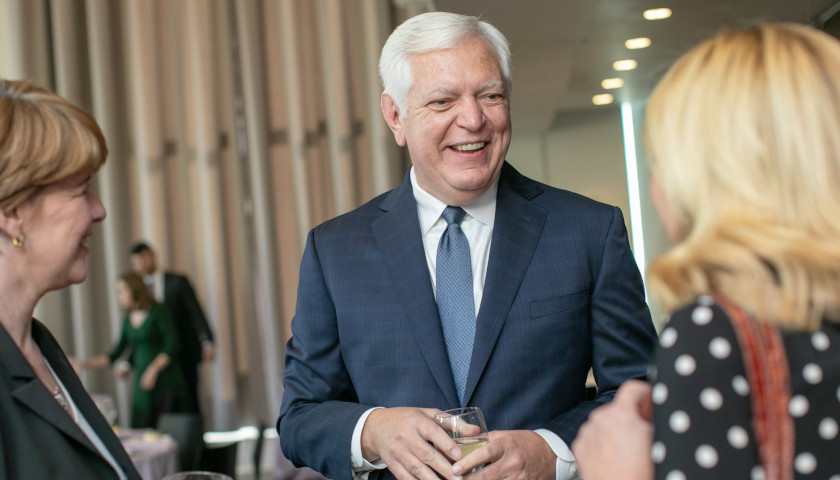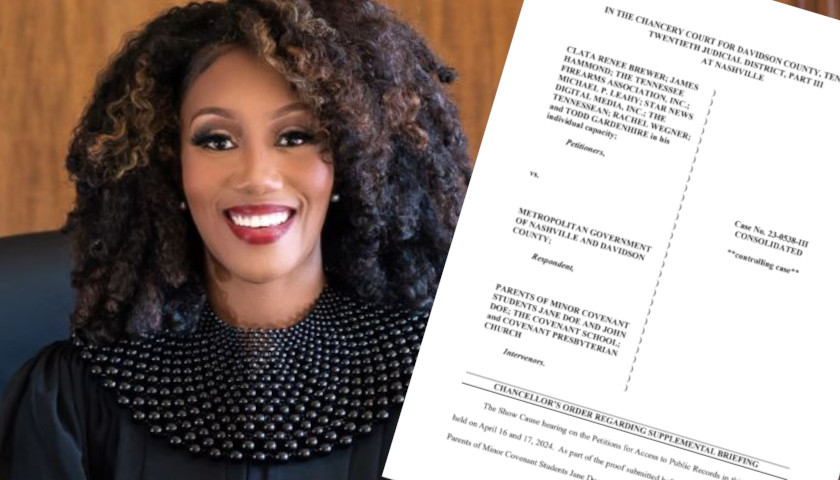On Thursday’s Tennessee Star Report with Michael Patrick Leahy – broadcast on Nashville’s Talk Radio 98.3 and 1510 WLAC weekdays from 5:00 a.m. to 8:00 a.m. – host Michael Patrick Leahy welcomed former Wilson County GOP Chair Terri Nicholson on the newsmakers line to talk about the Tennessee Star-Wilson County town hall this Monday evening which will address the Wilson County refugee resettlement issue.
During the second hour, Nicholson expressed her excitement that Mt. Juliet had just unanimously passed the no consent to refugee resettlement resolution. Leahy and Nicholson discussed the dynamics of allowing more refugees into Tennessee and how they are handled by a Davidson County agency that cannot place them in the county because of the high cost of living.
They noted a loophole that allows the agency to settle them within a 50-100 miles radius affecting outlying counties such as Wilson. The Tennessee Star is sponsoring a Wilson County town hall this Monday at DT McCalls on West Main in Lebanon at 6:30 p.m. to address this issue and discuss questions and concerns from the community regarding the refugee resettlement program.
Leahy: We are joined now by our good friend, Terri Nicholson the former chairwoman of the Wilson County Republican Party who’s has been leading the charge to get the Wilson County Commission to pass a resolution saying that they don’t want any more refugees in Wilson County. Terri, there’s been a lot of developments over the past week or so. Welcome to The Tennessee Star Report.
Nicholson: Good morning Michael!
Leahy: We’ve scheduled a town hall meeting on this coming Monday in Lebanon. The Wilson County Commission decided a couple of weeks ago that they were going to table this resolution that you put forward. They wouldn’t explain why. So, The Tennessee Star Report has decided to sponsor this town hall on Monday at 6:30 p.m.
It will be at the DT McCalls in downtown Lebanon. You’ll be there. I’ll be there as a sort of master of ceremonies. And Don Barnett a fellow at the Center for Immigration Studies explaining why it’s a good idea for the county to pass this resolution. But there’s more news coming out. What’s the city of Mt. Juliet done on this?
Nicholson: We got great news this morning and a lot of good activity. The exciting thing that happened is that the city of Mt. Juliet unanimously passed the no consent to refugee resettlement.
Leahy: When did that happen, Terri?
Nicholson: That happened on February 10 at the commission meeting.
Leahy: Wow. That’s big news.
Nicholson: Yes, we were very excited. We kind of handled this a different way than we did the county. I didn’t get on the social media or radio with you or anything or post a whole lot about it. And that really, in my opinion, worked out very well because the commissioners were able to do their job the way it should be efficiently. And come upon the resolution the way that they felt was correct.
Leahy: Has there been any movement on the Wilson County level? Are they revisiting this resolution?
Nicholson: You know we certainly can. To me, it would be perfectly acceptable because it gives anybody the questions to ask so they can better understand the situation. And more than anything, it shows the constituents that hey, we care and what you say does matter to us. So I would definitely be excited to have them bring it back if they felt necessary.
Leahy: We will talk about this on this coming Monday’s town hall meeting at 6:30 p.m. about the Wilson County Commission decision to table the resolution that would say the county doesn’t want any more refugees. The background, of course, is that the President signed an executive order fulfilling the campaign promise saying that state and local governments have to agree to the resettlement of refugees.
In December here, Governor Lee, without consulting the Tennessee General Assembly, which has a lawsuit in federal court to stop the resettlement of refugees here. He decided it would be a great idea here to have more refugees. He claimed that it was just for 2020 and that he could reverse that at any time.
He kind of submarined the lawsuit BUT as we’ve pointed out in stories, all the Democratic presidential candidates want to dramatically increase the number of refugees coming into the country. Michael Bloomberg wants to increase it by almost 700%.
Nicholson: I know.
Leahy: So what will happen in Tennessee if the federal government says instead of 18,000 refugees coming in fiscal 2020, let’s say Michael Bloomberg gets elected president and he wants to increase it to 125,000, they’re coming to Tennessee I guess under Gov. Lee’s decision.
Nicholson: Apparently so.
Leahy: That’s one of the considerations that the county ought to keep in mind. I’m trying to figure out why Terri they do not have a discussion on this when the vote came up last month?
Nicholson: They did have a discussion when it went into the legislative sub-committee. And they voted unanimously to move it out of the legislative sub-committee. And I will say that there were several county commission members who were there and the chairman who gave the opportunity for anybody to ask questions at that time.
And nobody did and the resolution passed unanimously. So we felt very good about it. And then it was next week when it came to the floor for a full vote and that’s when out of the blue without a discussion it was tabled.
Leahy: It was tabled.
(Commercial break)
Leahy: There was virtually no discussion on this controversial decision in advance of that vote on that night. We are holding this town hall to have that discussion that the Wilson County Commission failed to have. Terri, you are very well known and active in the county. When you talk to people about this what kind of reaction do they have to the Wilson County Commission decision?
Nicholson: Well they obviously want to hear and partake in the discussion and learn what exactly it would mean to Wilson County if and when we were able to assimilate refugees. And let me back up just for a minute and say, this is not an act of being anti-refugee at all. This has to do with adhering to the executive order from the President where he highly encouraged state and local government to consult.
And we did not have that opportunity, so, therefore, we want to put a pause and say at this time, no. We need to examine our infrastructure, our willingness, and the ability to do exactly what the governor would like to do. And that’s what it boils down to. It boils down to us having the opportunity in all counties to have that discussion and participate by listening to constituents to find out if they are willing and able.
Leahy: There’s a lot of cost to the settlement of refugees in any area. Particularly in Wilson County according to the Governor’s plan, most of these refugees are resettled out of an agency in Davidson County. But under the rules, they can be settled anywhere within a 50-mile radius.
Which means housing is very expensive in Nashville. And so they have a budget from the federal government to get started. So that means they’re not going to put them in Davidson County because it’s too expensive. They’re going to put them out in Wilson, Williamson, and Rutherford County. Wilson County is growing like crazy. It’s crowded already, isn’t it?
Nicholson: We are it’s a great problem to have. We are thrilled that everybody wants to come and live in this great county. I know I am. But again, we need to look at the infrastructure and determine what is best for Wilson County and what is best for those moving in. If you look at the funding notice, the federally contracted resettlement agencies to resettle different groups, as you said anywhere between 50-100 miles so we stand to accept several if this were to play out.
We just need to have a good idea of what that means. Because when you look at the money, as you mentioned, the federal dollars do not cover the short and long term costs associated with the federal refugee program. So where does that money come from? Well, the money comes from us ultimately.
Leahy: Before President Trump was elected, President Obama welcomed in his last year about 90,000 refugees were admitted into this program. About 1,600 of them came to Tennessee per year. Now, under President Trump, this year the number of refugees dramatically decreased to 18,000. About 400-500 of them have come to Tennessee already in this year under Governor Lee.
They’re not coming from hotbeds of terrorism quite as much. Although we still have some from Somalia. They’re coming from high tuberculosis countries like the Republic of Congo and Burma. By the way, the president just put a travel ban on Burma. But they’re still bringing refugees in from Burma. Now, we’ve tried to get an answer from Gov. Lee to explain why he’s opened the door to refugees.
And especially in light of the fact that with any of the Democratic candidates, the number of refugees coming into the country will be five, six, seven times greater than they currently are. By the way, we’ve invited Gov. Lee to attend on Monday night. And the old saying is, when the phone didn’t ring Terri, we knew it was Gov. Lee accepting our invitation to be there on Monday night. (Leahy laughs) But it’s still open.
Nicholson: Sure. And that would be great too. It helps everybody to hear all the sides and opinions and goals of what we all would like to accomplish. I certainly would love and welcome the opportunity to have this discussion.
Leahy: We’ll see. Don’t hold your breath about the Governor showing up to explain this. I don’t think he can offer a rational explanation for it, but if he can, he can come Monday night on February 17th, at 6:30 p.m. at DT McCalls on West Main Street in Lebanon. There should be plenty of parking there.
Listen to the full second hour here:
– – –
Tune in weekdays from 5:00 – 8:00 am to the Tennessee Star Report with Michael Patrick Leahy on Talk Radio 98.3 FM WLAC 1510. Listen online at iHeart Radio.








